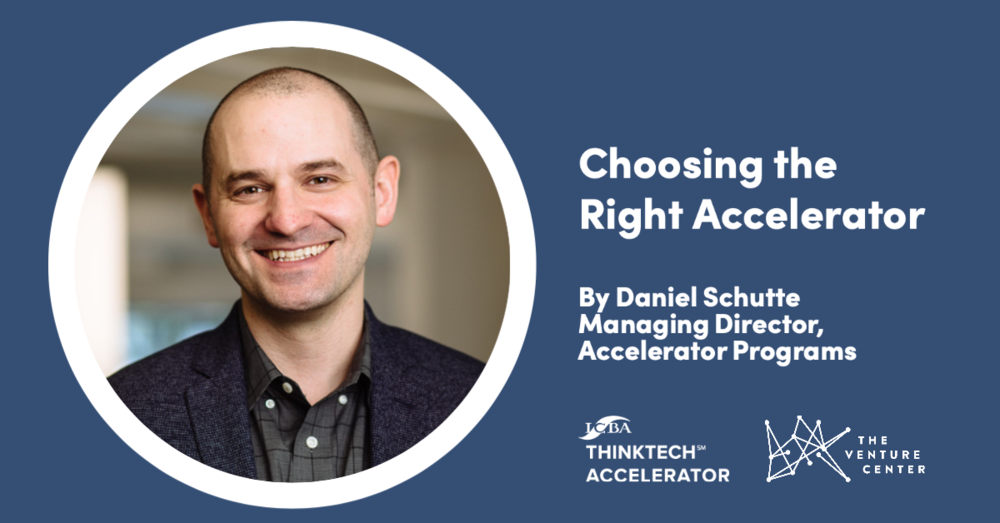
How to Choose the Right Accelerator
By Daniel Schutte
Managing Director, Accelerator Programs
Accelerator programs are extremely competitive because the benefits of being selected are so high, so when a company applies, understanding which accelerators are the best fit is important. Here are just a few ways to make that determination for your company.
First, do your research.
Today, the market is overwhelmed with accelerators/incubators who offer the opportunity to scale your company through some, often nebulous, mechanism. It is difficult to pin down an exact figure, but there are at least 7,000 self-reported accelerators in the US and Europe alone…this is up from 200 just seven years ago. As a founder, you need to be conscious of where you spend your time, so I’ve highlighted some things I believe you should pay attention to when you’re making decisions for your company concerning what programs you participate in.
Vintage
In the venture capital world, you’ll hear the word vintage thrown about. “Vintage” refers to the amount of time since the founding of the venture capital firm. This is because if a firm has been around for a long time, then they must have made some significant investments. They can raise funds, and they know how to help founders grow their businesses and persist in a competitive environment for an amount of time.
While you may not hear it often, an accelerator’s vintage is absolutely something that you as a founder should be inquiring about. It is perfectly reasonable to ask how long has this group been around. Several years is an eternity in this space.
Track Record
There is only one thing that matters when it comes to accelerators, and that is whether or not they accelerate companies. Technically acceleration toward failure is still acceleration, but tabling that for a moment, let’s focus on positive results. It is reasonable to assume that what has been done for other companies is likely to be done for your company. The existing process, while it may and should evolve, will remain functionally similar year to year.
A few good questions are how many of portfolio companies are still operating two to three years out? How many won business that generated from the program? How many closed funding from contacts they made during the program? In a corporate-sponsored accelerator, how many companies move into a proof of concept with the corporate partner? Of those, how many evolved into commercial relationships?
Terms
There is no such thing as a free lunch, which may seem obvious, but understand that every organization running an accelerator has a reason for doing so. These reasons range from economic development to deal flow, and you shouldn’t be afraid to ask how the people running the program benefit and what success looks like for them. Many accelerators invest and take equity, so you should be sure to ask at what terms (valuation) they invest. Is this a capital investment or some mix of capital and services rendered (or even pure services)? If it is a capital investment, does that all post upfront, or is it tranched? If it is tranched, what are the stipulations under which the tranches are released?
Peer Review
I’m always surprised that more founders don’t ask to meet program alumni, which is one of the best ways to learn what you will experience by participating in the program. Depending on the program, alumni are generally a reliable source of information.
If an organization won’t foster a connection with their alumni, you should ask yourself why.
Process
Some programs have a nebulous acceleration mechanism. If an accelerator cannot point to a repeatable process that has worked before and can be reasonably assumed to work again, then you at least need to know that. All programs are different, and I daresay none are strictly better than others, just be prepared for what you’re getting yourself into. If there is no process, expect your experience to be as good as the program leadership, which can be fantastic or terrible, depending upon the team.
Along those same lines, you’ll also want to know what your requirements are. Is this a 12-week onsite program where you’re expected to attend an MBA level curriculum for 8 hours a day? Is this a remote program with weekly touchpoints? Is this a program which facilitates meetings, but leaves you the remainder of the time to run your business? If it is onsite, are you expected to pay for your housing? Will you have office space? What you want to know before you sign up for anything is what the accelerator’s responsibility is and what your own is.
In Summary
These are general guidelines. An accelerator in its first year can be incredible. A program can sprout a unicorn company that pays for all the rest. One founder can have an incredible experience, while the founder next to her gets nothing out of a program. A tried and true process may fail for a specific company. Your goal as a founder is to gather as many data points as you can so that you can discern some probable outcomes from your participation.
Time is the most finite resource you have, and you need to spend it in the most efficient manner possible. Ask questions, not of me specifically, but everybody else. We all love founders who value their time because it lets us know that it isn’t your first rodeo. And if you’ve done this whole thing before, we’d like to think you’re better off for it.
The Venture Center is taking applications for the ICBA ThinkTECH Accelerator 3.0 now. To be considered for Fast Track status, apply before Sept. 2 at www.venturecenter.co/icbathinktech.
